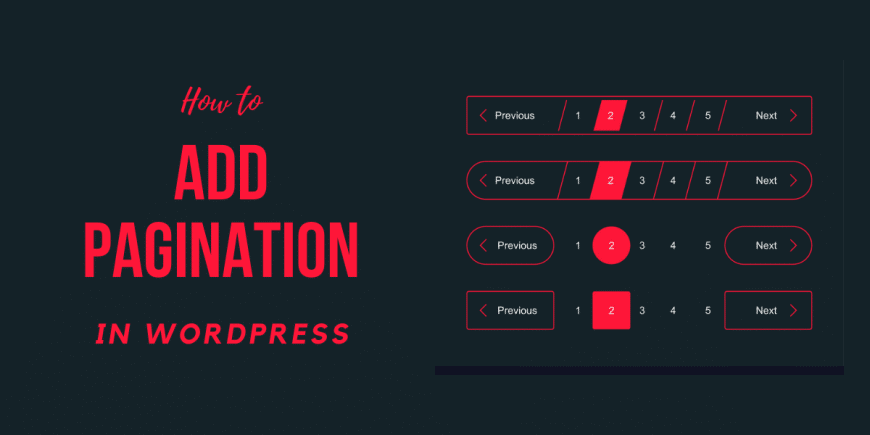pagination wordpress : WordPress Loop with Simple Pagination Code, Numeric Pagination, Ajax Pagination Example, Pagination for Custom Post Type and Custom Query Pagination WordPress and custom pagination function.
pagination wordpress – How To Add Pagination To WordPress?
Best WordPress Pagination Code Snippets with Examples
WordPress Loop with Simple Pagination Code
Simple pagination wordpress Code
wordpress pagination code for posts
WordPress Numeric Pagination
best pagination wordpress
max_num_pages <= 1 )
return;
$paged = get_query_var( 'paged' ) ? absint( get_query_var( 'paged' ) ) : 1;
$max = intval( $wp_query->max_num_pages );
if ( $paged >= 1 )
$permaurls[] = $paged;
if ( $paged >= 3 ) {
$permaurls[] = $paged - 1;
$permaurls[] = $paged - 2;
}
if ( ( $paged + 2 ) <= $max ) {
$permaurls[] = $paged + 2;
$permaurls[] = $paged + 1;
}
echo '' . "\n";
}
#STEP 2: Add to the templates using this call to the function above
pakainfo_numeric_pagination();
#STEP 3 : Style the Pagination appropriately to fit your theme styles
/** CSS Classes to Style the Pagination*/
.navigation li {
}
.navigation li a{
}
WordPress Ajax Pagination Example
pagination in wordpress plugin
num_per_page = 5;
$this->init();
}
protected function init() {
add_action( 'init', array( $this, 'add_rewrite_rule' ) );
add_filter( 'query_vars', array( $this, 'add_query_vars' ) );
add_action( 'parse_request', array( $this, 'parse_request' ) );
}
function parse_request( $wp ) {
if ( array_key_exists( 'cs-page', $wp->query_vars ) ) {
$page = isset ( $wp->query_vars['cs-page'] ) ? $wp->query_vars['cs-page'] : 1;
$args = array(
'post_type' => 'post',
'post_per_page' => $this->num_per_page,
'paged' => $page,
);
$query = new WP_Query( $args );
$values['total'] = $query->found_posts;
$values['per_page'] = $this->num_per_page;
$values['posts'] = array();
while ( $query->have_posts() ) {
$query->the_post();
$values['posts'][] = array(
'ID' => get_the_ID(),
'title' => get_the_title(),
);
}
wp_reset_postdata();
wp_send_json( $values );
}
}
function add_query_vars( $query_vars ) {
$query_vars[] = 'cs-page';
return $query_vars;
}
function add_rewrite_rule() {
add_rewrite_rule( '^cs-paginate/([0-9]+)/?', 'index.php?cs-page=$matches[1]', 'top' );
}
static function install() {
flush_rewrite_rules();
}
}
function pakainfo_ajax_pagination_init() {
new Pakainfo_Ajax_Pagination();
}
pakainfo_ajax_pagination_init();
register_activation_hook( __FILE__, array( 'Pakainfo_Ajax_Pagination', 'install' ) );
WordPress Pagination for Custom Post Type
pagination in wordpress custom template
'custom_post_type_name', 'posts_per_page' => 10, 'paged' => $paged ); $loop = new WP_Query( $args ); while ( $loop->have_posts() ) : $loop->the_post(); endwhile; ?>
don’t Miss : wordpress pagination example
Custom Query Pagination WordPress
5,
'category_name' => 'gallery',
'paged' => $paged,
);
$the_query = new WP_Query( $args );
?>
str_replace( $big, '%#%', esc_url( get_pagenum_link( $big ) ) ),
'format' => '?paged=%#%',
'current' => max( 1, get_query_var('paged') ),
'total' => $the_query->max_num_pages
) );
Custom Pagination in WordPress
Custom pagination in WordPress can be done using the paginate_links() function, which is a WordPress function that generates a paginated link list for posts or pages. Here’s an example code that demonstrates how to create custom pagination in WordPress:
$paged = ( get_query_var( 'paged' ) ) ? get_query_var( 'paged' ) : 1;
$args = array(
'post_type' => 'post',
'posts_per_page' => 10,
'paged' => $paged,
);
$custom_query = new WP_Query( $args );
if ( $custom_query->have_posts() ) :
while ( $custom_query->have_posts() ) : $custom_query->the_post();
// Display post content.
endwhile;
$total_pages = $custom_query->max_num_pages;
$pagination = paginate_links( array(
'base' => str_replace( 999999999, '%#%', esc_url( get_pagenum_link( 999999999 ) ) ),
'total' => $total_pages,
'current' => max( 1, $paged ),
'format' => '?paged=%#%',
'show_all' => false,
'type' => 'plain',
'end_size' => 2,
'mid_size' => 1,
'prev_next' => true,
'prev_text' => __('« Previous'),
'next_text' => __('Next »'),
'add_args' => false,
'add_fragment' => '',
) );
if ( $pagination ) :
echo '';
echo $pagination;
echo '';
endif;
wp_reset_postdata();
else :
// No posts found.
endif;
In this code, we first create a custom query using WP_Query(), which retrieves posts based on the specified arguments. The $paged variable is used to get the current page number, and it defaults to 1 if no page number is set.
After displaying the posts, we calculate the total number of pages using $custom_query->max_num_pages, and we use the paginate_links() function to generate the pagination links. The function takes an array of arguments that customize the appearance and behavior of the pagination links. For example, we can customize the link format, the previous and next text, and the number of links displayed before and after the current page.
Finally, we display the pagination links using an if statement that checks if the $pagination variable is not empty. We also use wp_reset_postdata() to restore the global post data to its original state.
Our Latest Best WordPress Plugin
- Remove Yellow BGBOX
- Bank IFSC Code
- New Tab Redirect Plus
- Set featured images for individual posts
- 4cgandhi
I hope you get an idea about pagination wordpress.
I would like to have feedback on my infinityknow.com blog.
Your valuable feedback, question, or comments about this article are always welcome.
If you enjoyed and liked this post, don’t forget to share.
